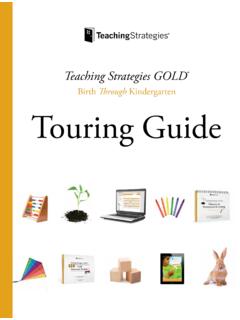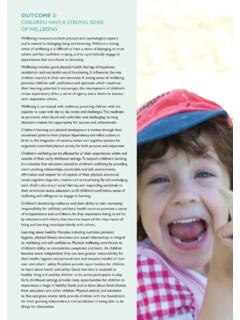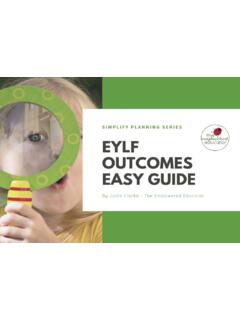Transcription of for EARLY CHILDHOOD PROFESSIONALS - dieecpd.org
1 DELAWARECOMPETENCIESfor EARLYCHILDHOODPROFESSIONALS INTRODUCTION Delaware Department of Education in collaboration with Delaware Higher Education and the Delaware EARLY CHILDHOOD community have developed these competencies as standards for the knowledge and skills expected of those PROFESSIONALS responsible for the care and education of young children in group programs. Purpose: To establish a set of core knowledge and competencies as standards for PROFESSIONALS working in EARLY CHILDHOOD programs in Delaware. These knowledge and competencies were developed in keeping with the following assumptions: Competent, well-trained PROFESSIONALS are the key to providing quality EARLY CHILDHOOD programs Competencies can be used to establish standards for employment and job performance There are a set of personal characteristics and attributes that support effective job performance in EARLY care and education Competencies should be considered emergent; developing over time with experience Competencies are cumulative and create a continuum for professional development Knowledge and competencies may be used: To design appropriate training and education For personal assessment of professional growth and planning for professional development As a tool for career advisement To plan for staff development To develop job descriptions To assess job performance As a piece of the process for issuing credentials, certificates, or licenses Each content area is organized to include: A general statement that establishes the significance of the content area to the EARLY CHILDHOOD field Required knowledge related to the content area Competencies for any given position incorporate all the competencies of previous positions Required competencies related to the content area, outlined by levels of job responsibilities: o Level 1: Assists in the implementation of curriculum.
2 Includes EARLY CHILDHOOD Intern, EARLY CHILDHOOD Assistant Teacher, Family Child Care Level I Licensee & Large Family Child Care Assistant o Level 2: Implements curriculum for a group of children; includes EARLY CHILDHOOD Teacher, Family Child Care Level II Licensee & Large Family Child Care Provider o Level 3: Designs and develops curriculum; includes EARLY CHILDHOOD Curriculum Coordinator o Level 4: Manages and leads the program; includes EARLY CHILDHOOD Administrator *Note: Large Family Child Care and Family Child Care Licensees will need to demonstrate competency in some of the Level 4 skills Delaware Staff Competencies: EARLY CHILDHOOD April 09 Delaware Staff Competencies: EARLY CHILDHOOD April 09 ATTRIBUTES AND CHARACTERISTICS OF EFFECTIVE EARLY CHILDHOOD PROFESSIONALS Exhibits stable and responsible work habits Accepts challenges and learns from mistakes Expects continuous change Takes time for regular reflection and self-examination Works cooperatively with co-workers in a team effort Demonstrates unconditional caring, warmth and respect for each child s uniqueness Serves as a model for children through their own conduct Exhibits the ability to be delighted and curious about children Displays imagination and creativity Employs humor and patience Communicates effectively with each child, both verbally and non-verbally Communicates effectively with adults Shows respect for the diversity of families, children and co-workers Exhibits ability to empathize with others Delaware Staff Competencies.
3 EARLY CHILDHOOD April 09 DELAWARE CORE KNOWLEDGE AND COMPETENCIES FOR EARLY CHILDHOOD PROFESSIONALS CONTENTS Child Development and Learning page 1 Environment and Curriculum 3 Promoting Social Emotional Development 6 Observation and Assessment 10 Health, Safety and Nutrition 13 Working with Families 16 Professionalism 18 Management and Administration 21 Self Assessment Instructions 24 Self Assessment Level 1 Appendix 1 26 Self Assessment Level 2 Appendix 2 30 Self Assessment Level 3 Appendix 3 36 Self Assessment Level 4 Appendix 4 40 Delaware Staff Competencies: EARLY CHILDHOOD April 09 1 CHILD DEVELOPMENT AND LEARNING CONTENT AREA STATEMENT: An understanding of how young children develop and learn is at the very core of the EARLY CHILDHOOD professional s knowledge base. All further training and education builds on this foundation.
4 Each professional is expected to draw on this knowledge to create environments and to interact with children in ways that support their development and learning. KNOWLEDGE: EARLY CHILDHOOD PROFESSIONALS will acquire training and education allowing them to demonstrate knowledge in the following areas: Major theories of child development Typical stages of development for children birth through age 8, developmental milestones in each of the domains, and the interrelatedness of those domains; physical, cognitive, language, social, and emotional Individual variability in development and learning Contextual influences on children s development Communication and partnerships with families to support children s development and learning Role of adult-child relationships and interactions in supporting children s development and learning Play as the context for children s learning Formal and informal practices and procedures for assessing children s development and learning Implications of child development for planning environments, curriculum, and activities Strategies for supporting individual children s development and learning, including children with special needs Delaware Staff Competencies.
5 EARLY CHILDHOOD April 09 2 CHILD DEVELOPMENT AND LEARNING (CD) LEVEL 1 LEVEL 2 LEVEL 3 LEVEL 4 Assists in the implementation of curriculum Implements curriculum for a group of children Designs and develops curriculum Manages and leads program Application of Child Development .1 Demonstrates an understanding that children grow and develop through play .2 Demonstrates an understanding that individual differences affect children s growth and development .3 Uses knowledge of developmental milestones, assists children in participating at their individual level of interest and ability .4 Interacts with children to support their development and learning .1 Uses informal observation as strategy for understanding individual children s development and learning .2 Applies knowledge of child development and learning to establish appropriate expectations of individual children .3 Uses knowledge of children s family, culture, and any risk factors when planning to support the development and learning of individual children.
6 4 Applies knowledge of child development to plan and implement developmentally appropriate activities and environments .5 Adapts activities and environments to meet the special needs and situations of individual children .6 Implements procedures for assessment of children .7 Keeps families informed about their child s developmental progress .1 Keeps up-to-date with current research and best practice about child development and learning .2 Designs curriculum based on knowledge of child development and learning .3 Supports staff in applying knowledge of child development and learning in daily practice .1 Ensures that the program s philosophy and mission express a commitment to supporting children s development and learning .2 Evaluates curriculum for attention to all developmental domains .3 Assesses program s responsiveness to the developmental needs of individual children, including those with special needs .4 Designs staff development plan to ensure all staff are trained in child development and learning Delaware Staff Competencies: EARLY CHILDHOOD April 09 3 ENVIRONMENT AND CURRICULUM CONTENT AREA STATEMENT: Young children learn best when they are involved in experiences and activities that appropriately promote their development and learning.
7 It is the responsibility of EARLY CHILDHOOD PROFESSIONALS to design the environment, plan the curriculum and use appropriate teaching strategies in order to support each child s learning. KNOWLEDGE: EARLY CHILDHOOD PROFESSIONALS will acquire training and education allowing them to demonstrate knowledge in the following areas: Concepts and principles of developmentally appropriate practice Play as a foundation for EARLY CHILDHOOD curriculum Curriculum planning that supports children in acquiring self-help skills, effective communication and problem-solving skills Curriculum planning that supports development in each of the domains; cognitive, language and communication, physical, social and emotional Curriculum planning for appropriate EARLY learning in the content areas; literacy, math, science, social studies, and creative expression Curriculum planning for children of different ages and stages of development Planning for schedules, routines and transitions to support children s learning and positive behavior Planning for an integrated curriculum Curriculum adaptation for children with special needs Planning for arrangement of the physical environment and selection of materials to support children s learning and development Providing learning opportunities that reflect children s culture and family experiences Teaching methods, practices and strategies that promote children s learning Delaware Staff Competencies: EARLY CHILDHOOD April 09 4 ENVIRONMENT AND CURRICULUM (EC) NOTE.
8 Curriculum activities that promote social emotional development are listed with Promoting Social Emotional Development rather than here LEVEL 1 LEVEL 2 LEVEL 3 LEVEL 4 Assists in the implementation of curriculum Implements curriculum for a group of children Designs and develops curriculum Manages and leads program Developmentally Appropriate Curriculum Planning .1 Interacts with and participates appropriately with children at all times .2 Asks age and developmentally appropriate questions and actively listens to children s responses .3 Encourages children to ask questions .4 Talks with children and stimulates conversation among children .5 Encourages and accepts children s creative expressions .6 Facilitates and supports children s participation in experiences and activities of the planned curriculum .1 Provides activities and experiences that promote physical development: * Large and small motor skills and control * Sensory experiences * Body awareness.
9 2 Provides activities and experiences that promote cognitive development: * Encourages children s curiosity, exploration and problem solving * Provides opportunities to sequence, organize, compare, and contrast .3 Provides activities and experiences that promote language development: * Uses conversation to enrich and expand vocabulary * Helps children acquire verbal and non-verbal means of communication .4 Provides activities and experiences that promote creative expression: * Emphasizes spontaneity and process rather than end product * Music, Art, Drama, Dance and Movement .5 Uses naturally occurring opportunities to encourage development of self-help skills: * independence in eating, toileting, dressing, and routine hygiene * awareness of basic health and safety rules .6 Provides age and developmentally appropriate activities and experiences that support emergent literacy: * Reads, sings, and plays games * Provides phonological, alphabet and book awareness * Makes connection between spoken and written language * Provides a print rich environment.
10 7 Provides activities and experiences that support emerging math and scientific thinking: * Concepts such as time, space, shape, pattern, quantity and number * Nature, ecology and living things * Machines, technology and non-living things * Scientific inquiry .8 Provides activities and experiences that support emergent thinking in social studies: * People; their diversity and how they live * Family and community * Money, work and resources * Geographical concepts of space and place * Concepts of past, present and future .1 Designs curriculum that supports children s progress in each of the developmental domains .2 Designs curriculum that supports children s emerging abilities in each of the content areas .3 Uses The Delaware EARLY Learning Foundations in designing curriculum .4 Provides regular support to staff for curriculum planning and implementation .5 Supports staff in adapting curriculum and activities for individual children, including those with special needs.










